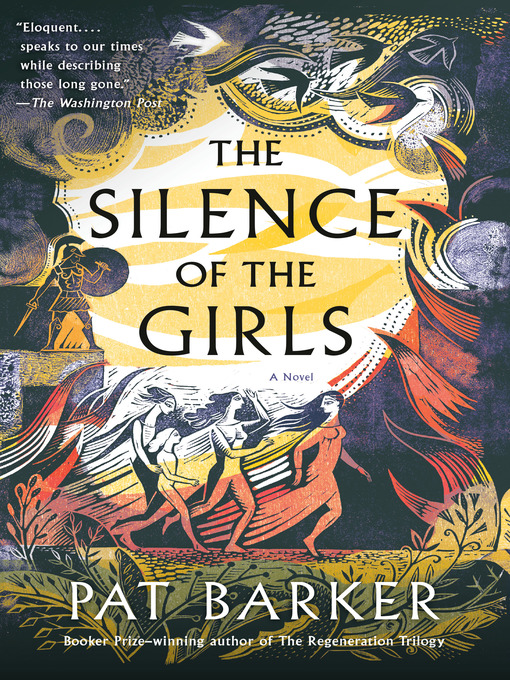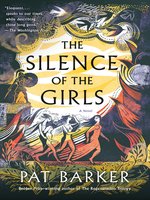-

July 9, 2018
Barker, author of the Booker-winning The Ghost Road, speculates about the fate of the women taken captive during the Trojan War, as related in Homer’s Iliad. Briseis, queen of the small country of Lyrnessus, was captured by the Greek forces and awarded to Achilles, fated to serve him as slave and concubine. Through her eyes readers see the horror of war: the sea of blood and corpses, the looting, and the drunken aftermath of battle. When Agamemnon demands that Briseis be handed over to him, Achilles reacts with rage and refuses to fight, and when his foster brother and lover Patrocles is killed, having gone into battle in Achilles’s stead, Briseis becomes the unwitting catalyst of a turning point in the war. In Barker’s hands, the conflict takes on a new dimension, with revisionist portraits of Achilles (“we called him the butcher”) and Patroclus (he had “taken his mother’s place” in Achilles’s heart). Despite its strong narrative line and transportive scenes of ancient life, however, this novel lacks the lyrical cadences and magical intensity of Madeline Miller’s Circe, another recent revising of Greek mythology. The use of British contemporary slang in the dialogue is jarring, and detracts from the story’s intensity. Yet this remains a suspenseful and moving illumination of women’s fates in wartime.
-

July 15, 2018
An accomplished hand at historical fiction respins the final weeks of the Trojan War.For her 14th novel, Booker Prize-winning Barker plucks her direction from the first line of the Iliad: "Divine Muse, sing of the ruinous wrath of Achilles...." The archetypal Greek warrior's battle cries ring throughout these pages, beginning on the first. The novel opens as Achilles and his soldiers sack Lyrnessus, closing in on the women and children hiding in the citadel. Narrating their terrifying approach is Briseis, the local queen who sees her husband and brothers slaughtered below. She makes a fateful choice not to follow her cousin over the parapet to her death. She becomes instead Achilles' war trophy. Briseis calls herself "a disappointment...a skinny little thing, all hair and eyes and scarcely a curve in sight." But in the Greek military encampment on the outskirts of Troy, she stirs much lust, including in the commander Agamemnon. So far, so faithful to Homer. Barker's innovation rests in the female perspective, something she wove masterfully into her Regeneration and Life Class trilogies about World War I. Here she gives Briseis a wry voice and a watchful nature; she likens herself as a mouse to Achilles' hawk. Even as the men boast and drink and fight their way toward immortality, the camp women live outwardly by Barker's title. Their lives depend on knowing their place: "Men carve meaning into women's faces; messages addressed to other men." Barker writes 47 brisk chapters of smooth sentences; her dialogue, as usual, hums with intelligence. But unlike her World War I novels, the verisimilitude quickly thins. Her knowledge of antiquity is not nearly as assured as Madeline Miller's in The Song of Achilles and Circe. Barker's prose is awkwardly thick with Briticisms--breasts are "wrinkled dugs" or "knockers." And she mistakenly gives the Greeks a military field hospital, which was an innovation of the Romans.A depiction of Achilles' endless grief for Patroclus becomes itself nearly endless.
COPYRIGHT(2018) Kirkus Reviews, ALL RIGHTS RESERVED.
-

Starred review from July 1, 2018
Queen Briseis and the women of Lyrnessus watch helplessly from the citadel as Achilles destroys the city, slaughtering their husbands, fathers, sons. When Briseis is made Achilles' slave as a prize of war, the one comfort in this horrifying new existence is Patroclus, Achilles' comrade and friend. When Agamemnon attempts to claim Briseis as his own, it changes the tide of the Trojan War. In graceful prose, Man Booker Prize winner Barker (Noonday, 2016), renowned for her historical fiction trilogies, offers a compelling take on the events of The Iliad, allowing Briseis a first-person perspective, while players such as Patroclus and Achilles are examined in illuminating third-person narration. Briseis is flawlessly drawn as Barker wisely avoids the pitfall so many authors stumble into headlong, namely, giving her an anachronistic modern feminist viewpoint. Instead, the terror of her experience of being treated as an object rather than a person speaks (shouts) for itself. Patroclus tells her things will change, and if they don't, to make them, to which Briseis, utterly powerless, replies, Spoken like a man. The army camp, the warrior mindset, the horrors of battle, the silence of the girls?Barker makes it all convincing and very powerful. Recommended on the highest order.(Reprinted with permission of Booklist, copyright 2018, American Library Association.)
-

Starred review from September 1, 2018
Following the fall of her city to the Greek army, Briseis, former queen of Lyrnessus, sister city of Troy, is awarded to Achilles as his captive and concubine. She tells her story of slavery, rape, and survival as an insider witnessing the strategies of Achilles and his closest companion Petroclus. Achilles comes to value Briseis to the point of refusing to go to battle when Agamemnon demands her services. The Greek army, demoralized by the loss of their greatest warrior, begins to lose ground to the Trojan forces until Petroclus dons Achilles's armor, fighting and dying in his place. Grief-stricken, Achilles reenters the fray and Troy is conquered. Barker gives the ancient tale of the ten-year-long siege and inevitable fall of Troy new life by presenting the women's point of view, showing women as the most vulnerable, and in many ways, most courageous victims of war. Readers will come away from this brilliant, beautifully written novel convinced that the so-called glorious death in battle is less important than the strength and determination required to survive against all odds. VERDICT Both lyrical and brutal, Barker's novel is not to savor delicately but rather to be devoured in great bloody gulps. A must read! [See Prepub Alert, 3/26/18; "Editors' Fall Picks," LJ 8/18.]--Jane Henriksen Baird, formerly at Anchorage P.L., AK
Copyright 2018 Library Journal, LLC Used with permission.
-

September 1, 2018
Booker Prize-winning Barker, who set her celebrated "Regeneration" trilogy during World War I, here reaches back in time to the Trojan War, when women served mainly as slaves or prostitutes or laid out the dead. At the heart of the narrative is not the battle between Greeks and Trojans but between Achilles and Agamemnon over Briseis, once queen of a kingdom neighboring Troy and now Achilles's concubine after he murdered her husband and brothers.
Copyright 2018 Library Journal, LLC Used with permission.
-
The Economist
"Almost Homeric in its brilliance... Refreshingly modern... Ms Barker [switches] nimbly between the daily drudgery of the camp and the horrors of conflict... Venerable scenes and mythic names magically become new... Domestic details are piercingly described, bringing the squalor of the camp to life... A masterful and moving novel."
-
Annalissa Quinn, NPR
"Beautifully done."
-
Bethanne Patrick, Washington Post
"Well-written as anything Barker has done before...The Silence of the Girls is a novel that allows those who were dismissed as girls--the women trapped in a celebrated historical war--to speak, to be heard, to bear witness. In doing so, Barker has once again written something surprising and eloquent that speaks to our times while describing those long gone."
-
Kate Atkinson, New York Times Book Review
"A very good, very raw rendition of the Trojan War from the point of view of the women."
-
Emily Wilson, translator of The Odyssey
"Brilliant, beautifully written... Both lyrical and brutal, Barker's novel is not to savor delicately."








